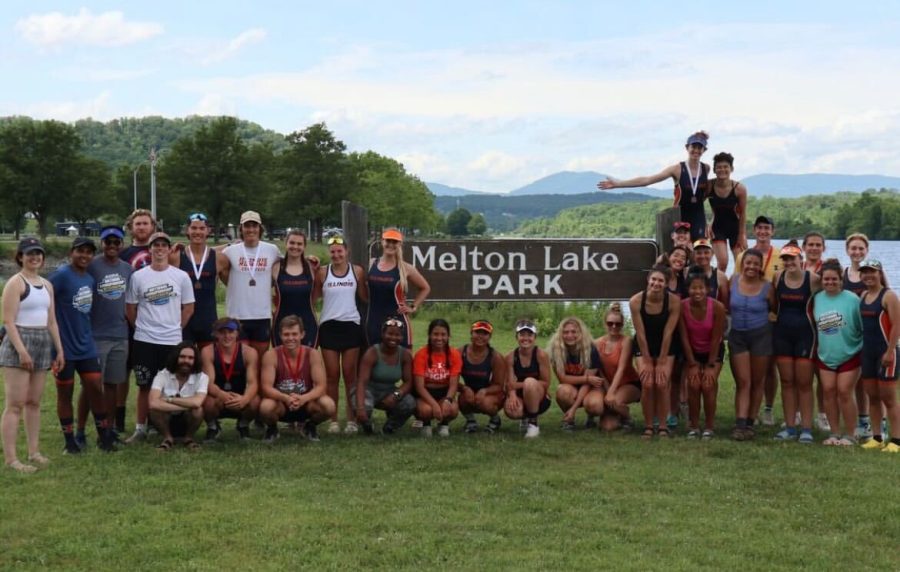‘The perfect environment’: Illinois rowing prepares for post-COVID-19 success, evolution of program
Photo courtesy of @illinirowing Instagram
The Illini Rowing team at Melton Lake Park in Oak Ridge, TN for the ACRA Championships that took place from May 20 to 22. Benjamin Calderone, president of the team and a senior in business, talks about his athletic journey and the team’s adjustment to normalcy after the pandemic.
Jun 17, 2022
While most members of the University of Illinois community may take advantage of their class scheduling flexibility to sleep in more, there’s a group of dedicated athletes who prioritize their love for rowing instead.
While taking in the sunrise over the trees of nearby Clinton Lake, where the Illinois rowing team practices, president Benjamin Calderone, a senior in Business, is ready to take his club to the next level after transitioning back into a post-COVID-19 reality.
“It was very stripped and it was a bit difficult,” Calderone said. “The team size was a lot smaller, and almost every single regatta was canceled.”
Calderone was enjoying his first year on the varsity men’s team when the pandemic started. With only one year of rowing experience under his belt at the time, Calderone was eager to continue building a community that had accepted him so early into his time at Illinois as a former athlete with an injury-laden career.
“I’ve been involved in sports and athletics ever since elementary school,” Calderone said. “I mainly did football, lacrosse and powerlifting throughout high school, but I had to take a few years off due to injury. I tore both my shoulders, shattered an ankle. After my freshman year convocation, I was walking out into a picnic area, and there were a lot of rowers handing out cards. I had heard about rowing and thought, ‘might as well try it out’.”
Get The Daily Illini in your inbox!
Rowing is easily one of the most iconic sports in collegiate athletics. With most high schools lacking a sanctioned team, early access to rowing for a large population of high schoolers is hard to come by. However, like Calderone, collegiate rowing is very attractive to those who are looking to continue high-level competition post-high school graduation.
Calderone describes rowing as a power-endurance sport, with continuous cardiovascular endurance added on to the strength required to move a boat with yourself, your teammates and any other gear on the boat. Learning the transition from your legs to your body to your arms in every single stroke is the biggest learning curve, according to Calderone. However, he hopes to entice anyone who’s willing to try and be committed to rowing to try out.
“It’s very easy to just send out a bunch of flyers, send out a bunch of posters,” Calderone said. “The men’s team was small due to a variety of reasons. I want to recruit a strong and competitive class of rowers who don’t have to have experience but really just people who want to work.”
While the rowing team likes to have fun and overall be a tight-knit group of friends, they recently went through a transition of culture, shifting their attention to becoming a competitive club rather than being a social one. Their hiring of head coach Michael Siravo, who holds over a decade of experience coaching rowers in the United Kingdom, brought a new level of dedication to the team.
“We had a serious sit down of what we wanted, and we decided that we want to win medals at nationals,” Calderone said. “We’re competing against big crews like Michigan, Virginia and Georgia. These people are training every single day. You really have to be determined and set in your training schedule. Our coach was honest with us and set that training schedule. It’s not all business 24/7, but during workouts we have tightened it up a bit — a bit more structure, a bit more planning in what we’re doing.”
Siravo, who holds a degree in sport and exercise science from St Mary’s University, Twickenham, has brought the results that the team wanted, coaching three ACRA All-Americans, 12 all-academics and multiple wins for both the men’s and women’s squads domestically.
Rowing training is intense, with the varsity teams practicing six days a week while the novice teams practice five days a week, with optional workouts in the evenings and multiple opportunities to continue improving and training.
“The first month of rowing, which starts two to three weeks into the school year, is mostly a trial period — you get to work out with us, try it out and see if you like it,” Calderone said. “If you do, you can join the team, and eventually you’ll go out to the lake where you can experience rowing on the water. If not, no hard feelings; we’re glad that we got to show you the sport, teach you a new workout.”
While the early workouts always get the biggest groan from recruits, according to Calderone, he defends those early wake-ups as “one of the biggest advantages when it comes to my academics.” Calderone notes that there are multiple STEM majors on the team, allowing them to be super focused during the day and one their homework while still getting their workouts in.
“You’ll never know until you try, which is why we have that trial period where you get to just try rowing out with us,” said Calderone. “We’ll teach you how to row, show you a bunch of circuits. You get to see the team environment, see if you like it. If you’re an ex-athlete or someone looking to get into athletics, be committed and gain a great group of friends in the process, then rowing is the perfect environment for you.”
@JonathanAlday7






